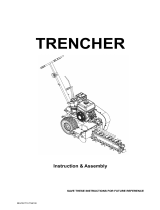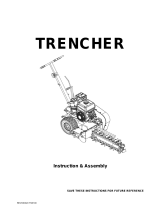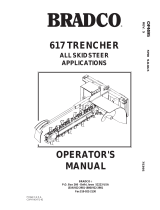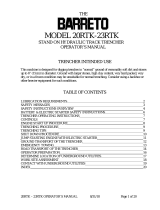
WARNING: Protecting Yourself and Those around You
Operating this Trencher safely is necessary to prevent or minimize the risk
of death or serious injury. Unsafe operation can create a number of hazards
for you. Always take the following precautions when operating:
WARING: General Safety
ENGLISH
ENGLISH
General Safety Rules General Safety Rules12 | | 13
WARNING: Safety for Children and Pets
WARNING: Safety with Gasoline - Powered Machines
Keep in mind that the operator or user is responsible for accidents or hazards
occurring to other people, their property, and themselves.
Always wear protective goggles or safety glasses with side shields while using
the Trencher to protect your eyes from possible thrown debris.
Avoid wearing loose clothing or jewelry, which can catch on moving parts.
Keep children and pets at least 50 feet(15m) from the working area and ensure
they are under the watchful care of a responsible adult.
Never allow children to operate the Trencher.
Wear shoes with non-slip treads when using your Trencher. If you have safety
shoes, we recommend wearing them. Do not use the machine while barefoot or
wearing open sandals.
Wear earplug when using your trencher to avoid noise.
Keep bystanders at least 50 feet (15m) away from your work area at all times.
Stop the engine when another person or pet approaches.
This is a high-powered machine, with moving parts operating with high energy. You must
operate the machine safely. Unsafe operation can create a number of hazards for you, as
well as anyone else in the nearby area. Always take the following precautions when using
this machine:
Never run the engine in an enclosed area or without proper ventilation as the exhaust
from the engine contains carbon monoxide, which is an odorless, tasteless, and a deadly
poisonous gas.
Store all fuel and oil in containers specifically designed and approved for this purpose
and keep away from heat and open flame, and out of the reach of children.
Replace rubber fuel lines and grommets when worn or damaged and after 5 years of
use.
completely. Don't handle gasoline if you or anyone nearby is smoking, or if you're near
anything that could cause it to ignite or explode. Reinstall the fuel tank cap and fuel
container cap securely.
If you spill gasoline, do not attempt to start the engine. Move the machine away from
the area of the spill and avoid creating any source of ignition until the gas vapors have
dissipated. Wipe up any spilled fuel to prevent a fire hazard and properly dispose of
the waste.
Allow the engine to cool completely before storing in any enclosure. Never store a
machine that has gasoline in the tank, or a fuel container, near an open flame or spark
such as a water heater, space heater, clothes dryer or furnace.
Never make adjustments or repairs with the engine running. Shut down the engine,
disconnect the spark plug wire, keeping it away from the spark plug to prevent accidental
starting, wait 5 minutes before making adjustments or repairs.
Never tamper with the engine’s governor setting. The governor controls the maximum
safe operation speed and protects the engine. Over-speeding the engine is dangerous and
will cause damage to the engine and to the other moving parts of the machine. If required,
see your authorized dealer for engine governor adjustments.
Keep combustible substances away from the engine when it is hot.
Do not operate the engine with the air cleaner or the carburetor air intake cover removed.
Removal of such parts could create a fire hazard. Do not use flammable solutions to clean
the air filter.
Tragic accidents can occur if the operator is not alert to the presence of children and pets.
Children are often attracted to the machine and the digging activity. Never assume that
children will remain where you last saw them. Always follow these precautions:
easily ignited and cause a fire or explosion. Never overlook the hazards of gasoline. Always
follow these precautions:
Your Trencher is a powerful tool, not a plaything. Exercise extreme caution at all times.
The machine is designed to dig trench. Do not use it for any other purpose.
Know how to stop the Trencher quickly.
Exercise caution to avoid slipping or falling.























